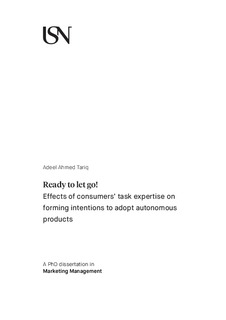| dc.description.abstract | The concept of self-performing products can be traced back to the world’s earliest civilizations and has long been a staple of science fiction. Fiction has now become reality as we experience the rise of autonomous products in every conceivable domain of life. Autonomous products are transforming the way we perform many consumption tasks, including everyday activities such as driving, cooking, and recreational activities such as biking and skiing. However, very little marketing research has examined the consumer preferences for autonomous products. This dissertation seeks to provide deeper insights into whether consumers differ in how they perceive the usefulness and risk associated with autonomous products when adopting such products. The significance of autonomous products is that they can either assist the user by performing a given set of subtasks or replace the user by performing the entire consumption task without user interaction. In this dissertation, I propose that consumers will diverge in their perceptions of usefulness and risk and subsequent intentions to adopt assistive vs. replacement technology, depending on their degree of task expertise. Across three experimental studies using three consumption tasks (i.e., driving, cooking, and skiing), the findings converge.
The results from empirical investigation confirmed that the consumers’ task expertise is a crucial driver in the evaluation of usefulness and risks, and subsequent intentions to adopt autonomous products. More importantly, I demonstrated that consumers with higher levels of task expertise perceive assistive technology to be more useful and less risky compared to replacement technology. In contrast, consumers with low task expertise perceive replacement technology to be more useful and less risky compared to assistive technology. Finally, perceptions of usefulness and performance risk will further affect adoption intentions. The findings have substantial theoretical implications for research on expertise and technology, and managerial implications for targeting autonomous products. | nb_NO |

